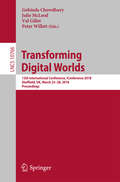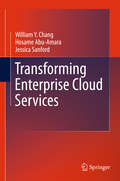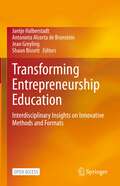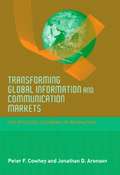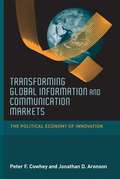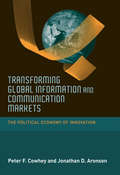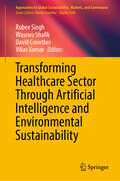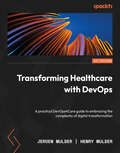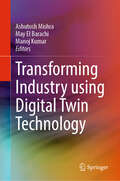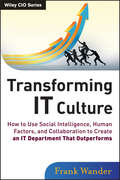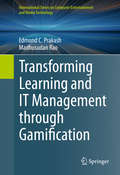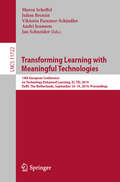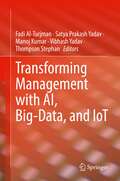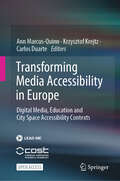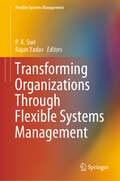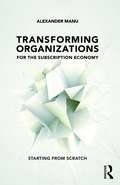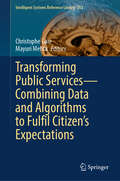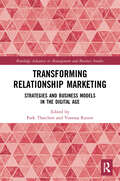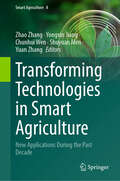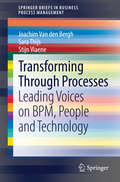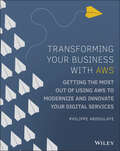- Table View
- List View
Transforming Digital Worlds: 13th International Conference, Iconference 2018, Sheffield, Uk, March 25-28, 2018, Proceedings (Lecture Notes in Computer Science #10766)
by Julie McLeod Gobinda Chowdhury Val Gillet Peter WillettThis book constitutes the proceedings of the 13th International Conference on Transforming Digital Worlds, iConference 2018, held in Sheffield, UK, in March 2018. The 42 full papers and 40 short papers presented together with the abstracts of 3 invited talks in this volume were carefully reviewed and selected from 219 submissions. The papers address topics such as social media; communication studies and online communities; mobile information and cloud computing; data mining and data analytics; information retrieval; information behaviour and digital literacy; digital curation; and information education and libraries.
Transforming Enterprise Cloud Services
by Jessica Feng Sanford Hosame Abu-Amara William Y ChangTransforming Enterprise Cloud Services addresses the fundamental ideology of Cloud Services and how enterprises in commercial, federal, and defense industries can transform their current information technology and management models to adopt this new method. It goes beyond the mere description of service frameworks in relation to cloud technologies and operations and provides practical path-forward solutions for identified challenges. For instance, as organizations transform their data and service models to compete in a new environment where data and services coexist with others in a public-held eco-system, enterprises have to face the challenge of data synthesis from a massive number of sources. One answer to this issue relies on a cross-organizational policy and technology coordination that can ensure that data will not be reproduced or manipulated by unauthorized entities. Transforming Enterprise Cloud Services explains how organizations can justify their current practices to take advantage of such collaboration synthesis securely, safely, reliably, and cost-effectively. Transforming Enterprise Cloud Services elucidates the service-oriented nature of Cloud Services and identifies issues and challenges from clients' and vendors' perspectives. It also portrays how enterprise operators can successfully deploy their IT environment from both business and technical perspectives to enable massive scalability, high resilience, enforced security, and collaborative dynamics.
Transforming Entrepreneurship Education: Interdisciplinary Insights on Innovative Methods and Formats
by Jantje Halberstadt Jean Greyling Antonieta Alcorta de Bronstein Shaun BissettThis open access book provides selected teaching approaches, supporting methods, concrete examples of curricula as well as extracurricular teaching formats, which are predominantly tailored to both African and German requirements. These approaches were developed by the YEEES Training and Research Centers, an international interdisciplinary network of university teachers and researchers from Germany and southern Africa, and combine the fields of management, entrepreneurship, information and communication technologies (ICT), and sustainability. The book shows how current scientific results can be integrated into teaching, how students can contribute to research while learning, and how research can contribute to the development and evaluation of new formats. It is thus relevant for university teachers, researchers, students as well as practitioners who want to educate and act as future change agents.
Transforming Global Information and Communication Markets
by Peter F. Cowhey Jonathan D. Aronson Donald AbelsonInnovation in information and communication technology (ICT) fuels the growth of the global economy. How ICT markets evolve depends on politics and policy, and since the 1950s periodic overhauls of ICT policy have transformed competition and innovation. For example, in the 1980s and the 1990s a revolution in communication policy (the introduction of sweeping competition) also transformed the information market. Today, the diffusion of Internet, wireless, and broadband technology, growing modularity in the design of technologies, distributed computing infrastructures, and rapidly changing business models signal another shift. This pathbreaking examination of ICT from a political economy perspective argues that continued rapid innovation and economic growth require new approaches in global governance that will reconcile diverse interests and enable competition to flourish. The authors (two of whom were architects of international ICT policy reforms in the 1990s) discuss this crucial turning point in both theoretical and practical terms.
Transforming Global Information and Communication Markets
by Peter F. Cowhey Jonathan D. Aronson Donald AbelsonInnovation in information and communication technology (ICT) fuels the growth of the global economy. How ICT markets evolve depends on politics and policy, and since the 1950s periodic overhauls of ICT policy have transformed competition and innovation. For example, in the 1980s and the 1990s a revolution in communication policy (the introduction of sweeping competition) also transformed the information market. Today, the diffusion of Internet, wireless, and broadband technology, growing modularity in the design of technologies, distributed computing infrastructures, and rapidly changing business models signal another shift. This pathbreaking examination of ICT from a political economy perspective argues that continued rapid innovation and economic growth require new approaches in global governance that will reconcile diverse interests and enable competition to flourish. The authors (two of whom were architects of international ICT policy reforms in the 1990s) discuss this crucial turning point in both theoretical and practical terms.
Transforming Global Information and Communication Markets: The Political Economy of Innovation (Information Revolution and Global Politics)
by Peter F. Cowhey Jonathan D. AronsonInnovation in information and communication technology (ICT) fuels the growth of the global economy. How ICT markets evolve depends on politics and policy, and since the 1950s periodic overhauls of ICT policy have transformed competition and innovation. For example, in the 1980s and the 1990s a revolution in communication policy (the introduction of sweeping competition) also transformed the information market. Today, the diffusion of Internet, wireless, and broadband technology, growing modularity in the design of technologies, distributed computing infrastructures, and rapidly changing business models signal another shift. This pathbreaking examination of ICT from a political economy perspective argues that continued rapid innovation and economic growth require new approaches in global governance that will reconcile diverse interests and enable competition to flourish. The authors (two of whom were architects of international ICT policy reforms in the 1990s) discuss this crucial turning point in both theoretical and practical terms.
Transforming Healthcare Sector Through Artificial Intelligence and Environmental Sustainability (Approaches to Global Sustainability, Markets, and Governance)
by Vikas Kumar David Crowther Rubee Singh Wasswa ShafikThis book explores the intersection of artificial intelligence (AI) and sustainability in healthcare, focusing on how AI technologies are transforming medical practices while promoting environmentally responsible operations. It examines how AI-driven tools like machine learning and data analysis enhance diagnostic accuracy, streamline treatment planning, and personalize patient care by analysing large datasets, including genetic information. Additionally, the book addresses how AI can support sustainable healthcare practices by optimizing resource usage, such as energy consumption in hospitals, and improving supply chain management to reduce environmental impact. Practical case studies demonstrate how these technologies are being implemented to improve patient outcomes and achieve sustainability goals. The book considers the integration of AI into human resource management within healthcare, discussing AI's role in recruitment, performance management, and employee retention aligned with sustainability objectives. Ethical and regulatory issues surrounding AI adoption, such as data privacy and algorithmic transparency, are thoroughly examined, with an emphasis on creating responsible and equitable AI systems. Designed for healthcare professionals and administrators, this book provides practical strategies and real-world examples of AI implementation in sustainable healthcare, offering a balanced view of the opportunities and challenges ahead.
Transforming Healthcare with DevOps: A practical DevOps4Care guide to embracing the complexity of digital transformation
by Jeroen Mulder Henry MulderLeverage modern technologies and agile methodologies such as DevOps and microenterprises to deliver sustainable healthcare solutions.Purchase of the print or kindle book includes a free eBook in the PDF format.Key FeaturesDistinguish the pace and time of change to achieve sustainable healthcareApply shared mental models for common understanding of healthcare challenges and how to overcome themApply and integrate new technology to accelerate the digital transformation of healthcareBook DescriptionHealthcare today faces a multitude of challenges, which can be summed up as the barriers architects and consultants face in transforming the healthcare system into a more sustainable one. This book helps you to guide that transformation step by step.You'll begin by understanding the need for this transformation, exploring related challenges, the possibilities of technology, and how human factors can be involved in digital transformation. The book will enable you to overcome inhibitions and plan various transformation steps using the Transformation into Sustainable Healthcare (TiSH) model and DevOps4Care. Next, you'll use the observe, orient, decide, and act (OODA) loop as an iterative approach to address all stakeholders and adapt swiftly when situations change. Further, you'll be able to build shared platforms that enable interaction between various stakeholders, including the technology-enabled care service teams. The final chapters will help you execute the transformation to sustainable healthcare using the knowledge you've gained while getting familiar with common pitfalls and learning how to avoid or mitigate them.By the end of this DevOps book, you will have an overview of the challenges, opportunities, and directions of solutions and be on your way toward starting the transformation into sustainable healthcare.What you will learnUnderstand the need for transformation of healthcareAccelerate transformation using the TiSH modelGet to grips with stepped, networked, and integrated careApply DevOps methodologies for healthcare in DevOps4CareFind out how to handle complexities through the system of systems thinkingBundle and unbundle organizations for the delivery of true patient-centric healthcareWho this book is forThis book is written specifically for enterprise architects and management consultants dealing with transformation in healthcare. Professionals dealing with digital transformation of healthcare, including C-level executives such as chief medical information officers (CMIOs), CEOs, CIOs, and CFOs will also find this book interesting. Basic knowledge of IT systems and architecture will help you grasp the concepts easily.
Transforming Industry using Digital Twin Technology
by Manoj Kumar Ashutosh Mishra May El Barachi This book enables readers with varying backgrounds to understand the need for Digital Twin technologies. The authors describe how digital twin amounts to the convergence of the physical and the virtual worlds where each industrial process, asset, service, or product gets a digital replica and dynamic digital blueprint and representation, from the design phase to the deployment phase. Through this book, readers will be enabled to work on Digital Twin techniques and gain from experience. The book will provide a high level of understanding of the emerging technologies and why Digital Twin offers the potential of acquiring and processing a tremendous amount of data from the physical world.
Transforming It Culture: How To Use Social Intelligence, Human Factors And Collaboration To Create An It Department That Outperforms
by Frank WanderPractical, proven guidance for transforming the culture of any IT department As more and more jobs are outsourced, and the economy continues to struggle, people are looking for an alternative to the greed-driven, selfish leadership that has resulted in corporations where the workers are treated as interchangeable parts. This book shows how the human factors can be used to unlock higher returns on human capital such that workers are no longer interchangeable parts, but assets that are cared about and grown. Refreshingly innovative, Transforming IT Culture shows how neuroscientific and psychological research can be applied in the IT workplace to unleash a vast pool of untapped potential. Written by an expert on IT culture transformation Considers the widespread "cultural blindness" in business today, and how it can be addressed Draws on the author's repeated success transforming IT divisions across major corporations by applying the human factors Explains why social intelligence, human factors, and collaboration are the source of harmony, shared learning, mutual respect, and value creation Employees want positive change in business, something to stop the downward spiral we are on, both financially and emotionally. Transforming IT Culture shows how the essential ingredient to any high performing IT department is a culture where employees are valued and managed to their strengths. Using the Information Technology profession as a lens through which we can understand knowledge worker productivity and how to seriously improve it, this important new book reveals why Collaborative Social Systems are essential to every organization.
Transforming Learning and IT Management through Gamification
by Edmond C. Prakash Madhusudan RaoThis book explains how gamification, specifically enterprise gamification, can help mangers in multiple areas within an enterprise to improve attrition. Employee Engagement is an important component to foster employee relations with the organization. Gamification by its inherent design helps to increase engagement within an enterprise. Several successful case studies in Gamification are presented, which present new practical tips for Gamification for IT Management. By introducing general IT management concepts related to the specific environment managers work in, the authors then detail the benefits of introducing gamification in this very environment to resolve business issues. IT Managers, as well as HR professionals, Group Heads and Delivery Leaders will find this be a useful resource to understand how Gamification can improve their everyday work. The book can also be used as a reference for engaging learners and employees to improve their productivity in organizations.
Transforming Learning with Meaningful Technologies: 14th European Conference on Technology Enhanced Learning, EC-TEL 2019, Delft, The Netherlands, September 16–19, 2019, Proceedings (Lecture Notes in Computer Science #11722)
by Andri Ioannou Julien Broisin Viktoria Pammer-Schindler Maren Scheffel Jan SchneiderThis book constitutes the proceedings of the 14th European Conference on Technology Enhanced Learning, EC-TEL 2019, held in Delft, The Netherlands, in September 2019. The 41 research papers and 50 demo and poster papers presented in this volume were carefully reviewed and selected from 149 submissions. The contributions reflect the debate around the role of and challenges for cutting-edge 21st century meaningful technologies and advances such as artificial intelligence and robots, augmented reality and ubiquitous computing technologies and at the same time connecting them to different pedagogical approaches, types of learning settings, and application domains that can benefit from such technologies.
Transforming Management Using Artificial Intelligence Techniques (Artificial Intelligence (AI): Elementary to Advanced Practices)
by Vikas Garg Rashmi AgrawalTransforming Management Using Artificial Intelligence Techniques redefines management practices using artificial intelligence (AI) by providing a new approach. It offers a detailed, well-illustrated treatment of each topic with examples and case studies, and brings the exciting field to life by presenting a substantial and robust introduction to AI in a clear and concise manner. It provides a deeper understanding of how the relevant aspects of AI impact each other’s efficacy for better output. It’s a reliable and accessible one-step resource that introduces AI; presents a full examination of applications; provides an understanding of the foundations; examines education powered by AI, entertainment, home and service robots, healthcare re-imagined, predictive policing, space exploration; and so much more, all within the realm of AI. This book will feature: Uncovering new and innovative features of AI and how it can help in raising economic efficiency at both micro- and macro levels Both the literature and practical aspects of AI and its uses This book summarizing key concepts at the end of each chapter to assist reader comprehension Case studies of tried and tested approaches to resolutions of typical problems Ideal for both teaching and general-knowledge purposes. This book will also simply provide the topic of AI for the readers, aspiring researchers and practitioners involved in management and computer science, so they can obtain a high-level of understanding of AI and managerial applications.
Transforming Management with AI, Big-Data, and IoT
by Manoj Kumar Fadi Al-Turjman Satya Prakash Yadav Thompson Stephan Vibhash YadavThis book discusses the effect that artificial intelligence (AI) and Internet of Things (IoT) have on industry. The authors start by showing how the application of these technologies has already stretched across domains such as law, political science, policy, and economics and how it will soon permeate areas of autonomous transportation, education, and space exploration, only to name a few. The authors then discuss applications in a variety of industries. Throughout the volume, the authors provide detailed, well-illustrated treatments of each topic with abundant examples and exercises. This book provides relevant theoretical frameworks and the latest empirical research findings in various applications. The book is written for professionals who want to improve their understanding of the strategic role of trust at different levels of the information and knowledge society, that is, trust at the level of the global economy, of networks and organizations, of teams and work groups, of information systems and, finally, trust at the level of individuals as actors in the networked environments.Presents research in various industries and how artificial intelligence and Internet of Things is changing the landscape of business and management;Includes new and innovative features in artificial intelligence and IoT that can help in raising economic efficiency at both micro and macro levels;Examines case studies with tried and tested approaches to resolution of typical problems in each application of study.
Transforming Media Accessibility in Europe: Digital Media, Education and City Space Accessibility Contexts
by Carlos Duarte Ann Marcus-Quinn Krzysztof KrejtzIn a rapidly evolving digital landscape, accessibility in media has emerged as a crucial frontier for inclusion, equality, and knowledge democracy. The present edited volume "Transforming Media Accessibility in Europe: Digital Media, Education and City Space Accessibility Contexts" is a comprehensive exploration of technological, societal, psychological, and legal aspects of media accessibility in Europe. It offers a comprehensive roadmap for navigating the multifaceted landscape of media accessibility. Through compelling experimental studies, case studies, and forward-looking insights, it elucidates the transformative potential of accessible media across diverse sectors, including education, culture, and smart cities. Crafted as a collaborative effort under the COST (European Cooperation in Science and Technology) LEAD-ME Action (CA19142), this book unites the expertise of researchers, educators, and practitioners. This is an open access publication.
Transforming Organizations Through Flexible Systems Management (Flexible Systems Management)
by P. K. Suri Rajan YadavThe book focuses on key emerging areas concerning flexible systems management as an approach for transforming organizations. It is divided into three parts, discussing Enterprise Flexibility and Performance Management; Transformational Strategies and Organizational Competitiveness; and Supply Chain Flexibility. Part I addresses the integration aspects of learning, innovation, and entrepreneurship for organizational success, performance gains through cross-border acquisitions, flexibility measurement, and organizational competitiveness, impact of disinvestment, employability gaps and sustainable growth. Part II then examines risk governance structure, supporting culture, channel collaboration, waste management, IT-based process re-engineering, HR flexibility and adoption of big data as transformational strategies. Lastly, the third part investigates the development of a framework for a green flexible manufacturing system, measuring the effect of supply chain design on firm performance, exploring and ranking logistics service providers’ best practices, and exploring the relationship between optimism and career planning in the context of manufacturing sector, and analyzes customers’ emotional engagement and their inclinations towards the brand. The concept of flexibility is a common thread running through the three parts. The book is supported by both quantitative- and qualitative-based research as well as case applications relating to different areas of government and profit and not for profit organizations. Written by leading academics and practitioners, it is a useful resource for management students, scholars, consultants and practicing managers in both government and corporate sectors.
Transforming Organizations for the Subscription Economy: Starting from Scratch
by Alexander ManuThe emerging present is a fast-changing context for incumbent organizations, especially in market segments where online behavior is replacing physical proximity, and users engage with digital platforms for the acquisition of products and services. These are platforms that allow users to behave, to leave a mark, and to participate in the community of others, which are the values people now seek. Transforming Organizations for the Subscription Economy: Starting from Scratch aims to prepare executives for a world in which everything is social, augmented and autonomous; objects and spaces will have multiple purposes, capabilities and meanings. This is a new territory full of opportunity which is generally discussed only at the level of technology involved instead of the intellectual level, where the real understanding of the need for transformation resides. The book reveals ideas about what is possible if we transform the present. The narrative is organized around what is actual and what is potential; what is the probable future that we can arrive at through change, and what is the possible future that we can build through transformation. When engaging in transformation, the following strategic question develops: if you were designing your organization today, how would you design it? In other words, how would you go about it starting from scratch? This book provides the intellectual framework that empowers organizations to understand and navigate the emerging present, and to develop and deliver products and services of intrinsic value to users.
Transforming Organizations in Disruptive Environments: A Primer on Design and Innovation
by Igor Titus HawryszkiewyczThis textbook provides a design approach to the topics of innovation and disruption, by drawing on a variety of tools, techniques, and methods, and focusing on solutions that combine data and technology. The premise of the book is the creation of value for the organisations, stakeholders, and community, to enable creative transformation.The book highlights the importance of value and using knowledge to create a seamless roadmap that adds to stakeholder values through best practice business processes that use technology in innovative ways. Written in a clear, simple, and concise manner, avoiding complicated constructions and jargon, the book includes rich illustrations, and summaries and case studies that follow the roadmap at the end of each chapter.
Transforming Primary QTS
by Debbie Simpson Mike ToynThe changing landscape of primary teaching requires trainees to consider learning and teaching in new ways. This book supports trainee teachers working towards primary QTS in teaching primary ICT across all areas of the curriculum. Taking a truly cross-curricular approach, the text highlights meaningful links across the curriculum, while embracing the latest thinking and current good practice. A chapter on social networking and e-safety is included, giving essential guidance on this topical issue. This is followed by a section aimed at strengthening trainees' own skills and subject knowledge in ICT. Interactive activities and case studies link theory to practice and encourage the reader to rethink how ICT is taught in primary schools. This second edition is linked to the 2012 Teachers' Standards. About the Transforming Primary QTS series This series reflects the new creative way schools are begining to teach, taking a fresh approach to supporting trainees as they work towards prmary QTS. Titles provide fully up tp date resources focused on teaching a more integrated and inclusive curriculum, and texts draw out meaningful and explicit cross curricular links.
Transforming Public Services—Combining Data and Algorithms to Fulfil Citizen’s Expectations (Intelligent Systems Reference Library #252)
by Mayuri Mehta Christophe GaieThis book provides a precise portrayal of the current trends and future perspectives of e-Government. It outlines new approaches that optimize public services across diverse sectors. Going beyond traditional boundaries, it offers mathematical models for public services supported by convincing case studies. This book significantly enhances various government services, such as education, healthcare, safety, security, and culture. It also strongly emphasizes safeguarding citizens' personal data, ensuring privacy, and obtaining explicit consent. Tailored for students and academics, the book is an invaluable reference for teaching graduate courses in e-Government, Process Modelling, or Artificial Intelligence. Its impact extends beyond the classroom; civil servants from all domains can find practical insights to navigate the ongoing modernization of public services. Even citizens curious about the transformation in their public services can find this book enlightening. Researchers working in the area of e-Governance can use this book to discover the recent developments in e-Government.
Transforming Relationship Marketing: Strategies and Business Models in the Digital Age (Routledge Advances in Management and Business Studies)
by Park ThaichonRelationship marketing builds and maintains long-term relationships with customers through value creation and delivery. This book examines the key principles of relationship marketing and online relationship marketing. It looks at three main areas of relationship marketing as understanding relationship marketing and the continuum, the drivers and scope of relationship marketing, and how organisations should restructure for successful relationship marketing in the digital context. The book also addresses the opportunities and challenges associated with the implementation of relationship marketing in various types of organisation and suggests different effective relationship-building strategies and techniques for successful customer relationship management.
Transforming Teaching and Learning in Higher Education: A Chronicle of Research and Development in a Singaporean Context
by Seng Chee Tan Shen-Hsing Annabel ChenThis book chronicles the journeys of educational researchers and academics who have engaged in research and development to improve teaching and learning at universities. It highlights the research evidence, approaches, and in many cases, the journey of transformation rather than prescribing certain principles of and approaches to effective instruction. In other words, it not only describes the destination, but also various pathways leading toward it. Further, it focuses on mechanisms for improving the approaches discussed, rather than simply determining whether one works better than the other. As such, novice and seasoned academics and teaching staff in higher education will benefit from this book, not just from the teaching and learning approaches it highlights, but also from the insights into the respective journeys. The research and development methods and approaches discussed here will also appeal to researchers working in teaching and learning in higher education.
Transforming Technologies in Smart Agriculture: New Applications During the Past Decade (Smart Agriculture #8)
by Zhao Zhang Yuan Zhang Yongxin Jiang Chunhui Wen Shuyuan MenThis book collects transforming technologies in smart agriculture and their applications during the past decade. It focuses on the latest sensing and automation technologies for field and specialty crop production, and provides a lot of innovative knowledge on imaging processing, AI algorithms, robotics, and their applications in agriculture. It provides undergraduate or graduate students take-away knowledge for unmanned agriculture production, including but not limited to, corn/wheat disease detection, cotton yield prediction, and apple detection. Furthermore, this book includes review reports on plant phenotyping sensing and automation technologies and techniques for aphid detection.
Transforming Through Processes
by Joachim Van den Bergh Sara Thijs Stijn ViaeneThis book presents a series of twelve short interviews with inspiring practitioners and academics sharing insights in the world of process and transformation. The interviews tackle issues and questions about the future of Business Process Management (BPM), the impact of emerging technologies and customer centricity. It focusses the pitfalls in BPM implementations as well as cultural aspects and many more specific views. With the insights and experiences of leading experts the book provides a basis for the reader to achieve the next level of business process excellence, a discipline that holds potential for both practice and research.
Transforming Your Business with AWS: Getting the Most Out of Using AWS to Modernize and Innovate Your Digital Services
by Philippe AbdoulayeExpert guidance on how to use Amazon Web Services to supercharge your digital services business In Transforming Your Business with AWS: Getting the Most Out of Using AWS to Modernize and Innovate Your Digital Services, renowned international consultant and sought-after speaker Philippe Abdoulaye delivers a practical and accessible guide to using Amazon Web Services to modernize your business and the digital services you offer. This book provides you with a concrete action plan to build a team capable of creating world-class digital services and long-term competitive advantages. You’ll discover what separates merely average digital service organizations from the truly outstanding, as well as how moving to the cloud will enable your business to deliver your services faster, better, and more efficiently. This book also includes: A comprehensive overview of building industry-leading digital service delivery capabilities, including discussions of the development lifecycle, best practices, and AWS-based development infrastructure Explanations of how to implement a digital business transformation strategy An exploration of key roles like DevOps Continuous Delivery, Continuous Deployment, Continuous Integration, Automation, and DevSecOps Hands-on treatments of AWS application management tools, including Elastic Beanstalk, CodeDeploy, and CodePipeline Perfect for executives, managers, and other business leaders attempting to clarify and implement their organization’s digital vision and strategy, Transforming Your Business with AWS is a must-read reference that answers the “why” and, most importantly, the “how,” of digital transformation with Amazon Web Services.
